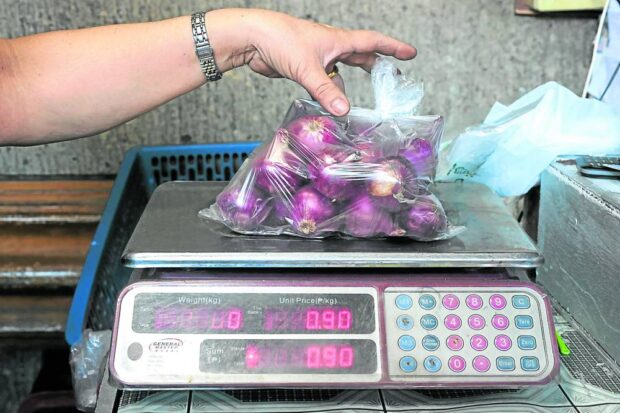
INQIURER PHOTO / GRIG C. MONTEGRANDE
After nine hearings on the alleged hoarding and price manipulation of onion and garlic, the House investigating panel ended up with the usual suspect, a businesswoman allegedly reigning over a well-oiled onion cartel and hinted at the likelihood of some Bureau of Plant Industry (BPI) officials acting as cogs in the machine.
Quezon Rep. Wilfrido Mark Enverga, chair of the House committee on agriculture and food, also maintained that in the face of the irregularities in the Department of Agriculture (DA), it would be favorable for the sector if President Marcos would stay on as its secretary.
At a press briefing on Thursday, committee member and Marikina Rep. Stella Quimbo urged the National Bureau of Investigation, the Philippine Competition Commission and the law enforcement arm of the DA to further “peel the onion cartel” uncovered by the panel, with “Lilia or Leah Cruz,” who was earlier linked to a garlic cartel, at the core.
Quimbo pointed out in a mix of Filipino and English: “If at the start of the hearings Leah Cruz was a denial queen, by hearing No. 9, for us, she is the undisputed onion queen.”
The panel concluded its motu proprio inquiry on Wednesday.
According to the lawmaker, “it was not easy to make sense of statements that were either contradictory, baseless, or senseless. It did not help that many of the witnesses were not at all cooperative and truthful in their statements. But at the end of the day, documents don’t lie.”
“A careful scrutiny of numerous public documents, including general information sheets, registries of the DA-BPI and the Department of Trade and Industry; the income statements submitted to the Securities and Exchange Commission (SEC) and the committee [and] the inventory reports submitted to the committee led me to the conclusion that the onion cartel is thriving,” she pointed out.
Connivance
Quimbo said that the committee found that “Leah Cruz operates the biggest onion cartel in the country… through an SEC-registered corporation called Philippine VIEVA Corp., which was established in 2013,” adding that PhilVIEVA was created at the time Cruz, a majority owner of the company, was first tagged as “sibuyas (onion) queen” in a series of 2012 news reports.
The lawmaker noted that PhilVIEVA was involved in the onion industry “from head to toe,” being engaged in farming, trading, cold storage and trucking, and practically cornering the market. She pointed out that although Cruz has been blacklisted as an importer, she was able to continue importing onions through PhilVIEVA and alleged dummy corporations.
“Based on public documents submitted by these corporations, we discovered that their registered telephone numbers were identical to the phone numbers in Leah Cruz’s office,” Quimbo said.
As for onion imports, the lawmaker pointed out that the process undertaken by the DA-BPI was unclear in the issuance of import clearances to limit the volume of produce being brought into the country to prevent harming local producers.
“In truth, it seems the DA-BPI is part of the equation of an onion cartel,” she said, adding that three companies under Cruz were the biggest yellow and red onion importers last year.
“How could the DA-BPI allow Cruz to import despite being blacklisted? Did someone play blind or connive with the DA-BPI to cheat the country?” Quimbo asked.
For his part Enverga said the committee could come up in two weeks with the inquiry report where there could be recommendations for the filing of criminal charges against specific persons, possibly including government officials.
The report would also propose legislation to fill in the gaps in existing laws that allow agri-product cartels to thrive as well as regulations in the operation of cold storage facilities.
He noted that Cruz was already facing charges in the Sandiganbayan and a Manila court for alleged hoarding, profiteering, price manipulation, and operating a cartel in the garlic industry.
“I think, this time the evidence linking them (to irregularities in the onion trade) might be stronger,” he said.
Zero conviction
Meanwhile, Sen. Risa Hontiveros on Thursday called on the Senate to push for stiffer penalties against public officials found to have used their office in abetting agricultural smuggling.
At the Senate committee on agriculture hearing, Hontiveros challenged the country’s top agriculture officials to “show a sample” of how Republic Act 10845, or the Anti-Agricultural Smuggling Act, was meant to deter the smuggling of agricultural products.
“In our antitrafficking law… we punish the facilitation of trafficking by public officials as acts of trafficking; in our antismuggling laws, it is but proper that we punish the facilitation of smuggling as acts of smuggling,” she said.
The committee on Thursday tackled six measures that seek to amend RA 10845.
But Hontiveros and Sen. JV Ejercito wondered why after seven years since its passage, no smuggler has yet been convicted.
Ejercito, author of RA 10845, conceded that the law may need to be amended due to its loopholes.

